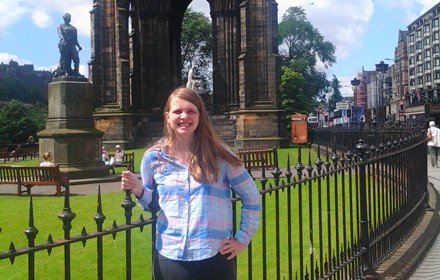Converse Student Studies Scottish Independence Debate

A Converse College student majoring in professional writing and political science will get experience in her chosen fields during her summer travels in Scotland.
Brandy Blanton, who will be a senior this fall, left for Scotland earlier this month to study the country’s independence movement. A referendum will be held in the country of 5 million Sept. 18, in which Scots will vote “yes” to become independent of the United Kingdom, which includes Scotland, England, Northern Ireland and Wales, or “no” to remain with the UK.
Blanton will be shooting video, taking photos, blogging and tweeting about her experience, and attending political debates and rallies on the issue.
Blanton received a research grant from the S.C. Independent Colleges and Universities (SCICU) to make the trip. Her research will focus on the 18-22 age group, and she will conduct interviews and surveys about what a yes or no vote would mean to the young people of Scotland. She’s researched the referendum issues but as a journalist, she’s not choosing sides.
“It’s living history,” Blanton said. “I see advantages to both sides.”
Scotland makes up a third of the UK’s land mass and accounts for 1/10 of the UK’s gross domestic product. Proponents of Scottish nationalism say the country is under-represented in the UK’s parliament. An independent Scotland will be able to make its own decisions to create a more financially secure country for the future, have a more fair tax system and introduce targeted tax policies that will encourage job creation and small business, according to supporters. Independence would also mean a savings in energy costs and a better standard of living for the people of Scotland.
The unionists, those who believe Scotland should remain with the UK, say studies show that an independent Scotland would have to cut public services, like schools and hospitals, by 8 percent, or would have to raise income taxes by 9 percent for sustainability of the nation’s finances. Unionists say Scotland benefits from a lower cost of living by being part of the UK, including cheaper goods at the supermarket, lower mortgage rates and lower energy bills. Leaving the UK could be risky for Scotland’s banks, which collapsed in 2008 and the UK bailed out, supporters of staying together say.
Also part of the debate is whether Scotland will continue to be able to use the pound as its currency, how it will fit in with NATO and the European Union, and where the UK’s nuclear-armed submarines would be based. The subs are now based at the Scottish port of Faslane, but nationalists say an independent Scotland will be a nuclear-free zone.
“I want to be a public diplomacy officer and work in international politics…to combine my love of politics and my love of journalism.”
Both the Scottish and U.S. media have reported in the last two months that a lead for the unionist side has dwindled.
At the G7 summit in Brussels June 4, President Barack Obama said the decision is up to the people of Scotland, but that the United States has “deep interest” in making sure one of its closest allies “remains strong, robust, united and an effective partner.” Speculation in the UK press is that Prime Minister David Cameron asked Obama to make a statement on the issue.
Blanton will be shooting video, taking photos, blogging and tweeting about her experience, and attending political debates and rallies on the issue. Next February, she’ll present the project during a SCICU symposium.
Blanton is also taking four summer courses at the University of Stirling during her stay. She’ll attend the 700th anniversary reenactment of the Battle of Bannockburn, a pivotal battle of the 13th- and 14th-century wars of independence between the kingdoms of Scotland and England. She returns to South Carolina Aug. 9, but will continue to research the movement through Sept. 18, when the referendum is held.
Blanton says her time in Scotland will be a perfect test run for what she plans to do after graduation.
“I want to be a public diplomacy officer and work in international politics,” Blanton said. “I want to combine my love of politics and my love of journalism.”
Joe P. Dunn, chair of the history and political science department at Converse, said Blanton learned the value of persistence, a trait journalists need, while trying to get permission to conduct her research interviews at the University of Stirling, which required numerous emails back and forth. She’ll gain experience conducting interviews and writing about what she learned in the field.
“It’s good training for a journalist,” he said. “Then as a political scientist, she will look at what’s happened after the referendum and conduct political analysis of the decision — why did people vote the way they did. It’s a good preparation for the direction she sees herself going in.”
Dunn will help her create a scholarly presentation for the SCICU symposium next year, but said Blanton, a star debater for the college’s Model NATO and Model Arab League, came up with her proposal on her own, which is typical of her.
“She has an idea a minute, and the genesis for this came from her,” Dunn said. “It’s indicative of her energy and enthusiasm. I know almost nothing about the Scottish election, and I’m curious with what she’s going to come back with.”
This article was written by Jenny Arnold of the Spartanburg Herald-Journal.